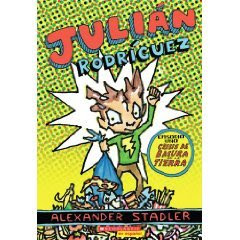Those who know me are well acquainted with my incurable optimism and can-do attitude. They count on me to see the good side of things and find solutions to problems—and I often do both. Looking back over this past year however, it seemed that I might have my work cut out for me. Because, Obama’s historic win aside, not much “good” seems to have taken place in 2008. When looking back, most will (rightly) recall a year riddled with layoffs, corporate bailouts, bonus and hiring freezes, and a general feeling of hopelessness, even among those who were “lucky” enough to remain employed.
But those of us who care about Latino literature can look back on this past year with a sense of pride, even renewed hope. We can and should remember that something truly great happened in 2008: some of our best and brightest (and in some cases, youngest) Latino authors received an unprecedented and well deserved amount of recognition; the kind hereto reserved only for Hollywood celebrities. It all started with
Junot Díaz’s
The Brief and Wondrous Life of Oscar Wao winning the Pulitzer Prize for Fiction. In 2008 it seemed as though
Junot was everywhere: On bestsellers lists—in both English and Spanish—, and on English and Spanish language media (Who can forget his appearance on the Colbert Report? And, ask a
Univison viewer about him and they will say: “
Junot has not forgotten where he came from,” or “I was surprised by how good his Spanish is!”). Yes,
Junot became a
bona fide literary celebrity over the past year. But he was not the only one who would receive that much-deserved praise.
Next, came the PEN USA awards. I had to read the announcement twice to make sure that I had not misread the names of not one, but TWO Latinos on the awards list. Yes, it was true! Daniel
Alarcón had won the Fiction Award for
Lost City Radio, and my dear friend Juan Felipe Herrera had (finally!) won the Poetry Award for his
187 Reasons Why Mexicanos Can’t Cross the Border! That was the moment when I decided that Latino authors were on a roll in 2008. They were unstoppable. Even a deceased Latino author received praise when Roberto
Bolaño’s
2666 made The New York Times’ “Best Books of 2008” list! And so, my optimism preserved, I set out to write a post about all of the accomplishments that have made 2008 a great year for Latino writing.
And then came the sobering reminder that there is still much work to be done, in the form of Melita Marie Garza’s piece for
Bloomsberg News, published on the second-to-last day of the year (a portion of which was reprinted in The New York Times on that same day). The article refers to a recent study that reveals a steady decline in the representation of Latino and African- American characters in
Newbery Award winners. The article quotes authors such as Sherman
Alexie and Julia Alvarez, as well as Pat Scales, the president of
ALSC (the Association for Library Services to Children that runs the
Newbery Award). I think it is worth reading, so I am sharing it here:
http://www.bloomberg.com/apps/news?pid=newsarchive&sid=aCT1f48_QwzoYou may draw your own conclusions after reading the article, but here is what I propose:
I propose that we use the momentum gained in 2008 to concentrate on providing the same amount of support granted to adult Latino literature to
children’s Latino literature. Let’s remember that 1 in 4 children younger than 5 living in the U.S. is now of Latino heritage, and that it is they who will carry our culture and tradition to future generations.
So, a toast to 2008: the year of (adult) Latino literature! And as we share in the joy, let's do everything we can to make 2009 the year of children’s Latino literature. I know we can!
 This is particularly exciting year for Día, because its founder, Pat Mora, has released her first ever Día themed bilingual picture book, entitled Book Fiesta!, illustrated by the amazing Rafael López. LibreríaLectorum.com recently interviewed the author about Día and her new book. Click here to read that interview. To learn more about Pat Mora, Día, and the book, visit the author’s website.
This is particularly exciting year for Día, because its founder, Pat Mora, has released her first ever Día themed bilingual picture book, entitled Book Fiesta!, illustrated by the amazing Rafael López. LibreríaLectorum.com recently interviewed the author about Día and her new book. Click here to read that interview. To learn more about Pat Mora, Día, and the book, visit the author’s website.
















